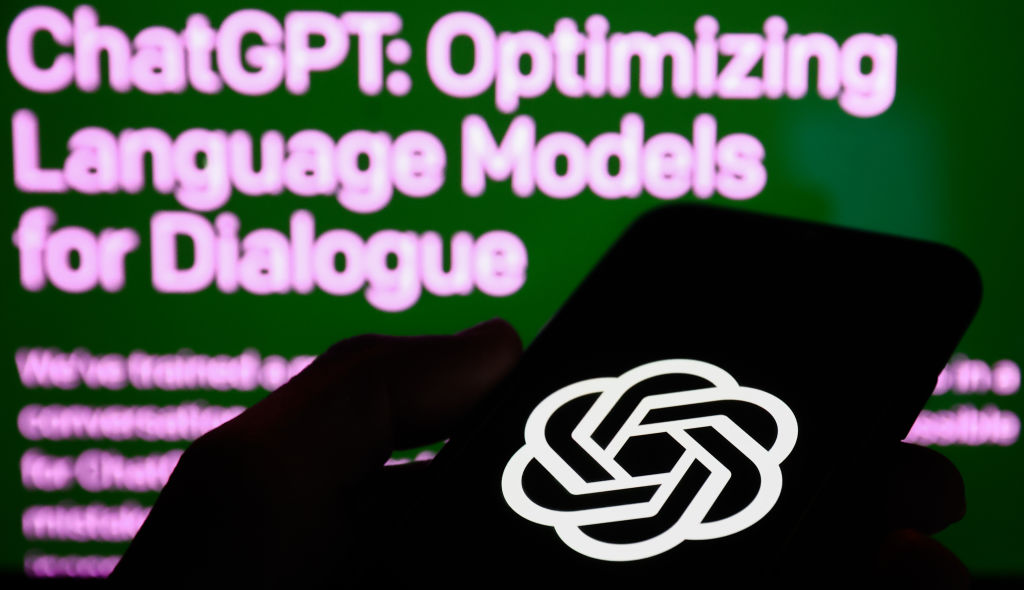Utah is prepared to revolutionize higher education.
The Botfire of the Humanities

ChatGPT promises to destroy liberal arts education.
Not all teachers luxuriated in our year and change of working in pajama bottoms during the lockdown. Despite the negative press we got for postponing our return to the classroom, no one among my peers wished to go back to the Zoom or “hybrid” teaching model. Perhaps what we educators thought was our guilt nagging at us for staying home was in fact the acute sense of our pending obsolescence.
The lesser-told education story of the pandemic is that while some people—many, in fact—took the pandemic as an opportunity to head to what they hoped were greener pastures, the ones who stayed gained a newfound appreciation for the traditional classroom and school campus. And even, in some cases, for our jobs. For teachers and, I can attest, a great number of students, schools were often the first place where a sense of community was rekindled from the ashes of social isolation. This has been my experience in Lockdown La-La Land, Los Angeles.
It seems even more ironic, then, that as I approach the halfway mark of my first truly normal post-pandemic school year—no mass testing, masking optional—I was greeted during a department meeting by the news that something called ChatGPT, an open platform AI resource, could be used to summarize articles, respond to essay prompts, and even tailor its machine-made prose to a specific grade level. Marx got plenty of things wrong, but this quote from the Communist Manifesto (1848) has aged remarkably well: “The bourgeoisie cannot exist without constantly revolutionizing the instruments of production, and thereby the relations of production, and with them the whole relations of society.”
I used to joke with my students that they would one day realize they could simply replace me with YouTube videos, but computer scientists have found something even better. A friend of mine, also a history teacher, offered up the example of photography supposedly unleashing a healthy wave of creativity and innovation in painting as a possible analog to the history teacher’s nascent predicament—which will only be compounded, by the way, as we feed the AI beast more and more free data with which to perfect itself. But what if, in keeping with larger trends across the national economy for the last 30 years or more, this “gain” in educational productivity is not offset by newer, better-paying jobs?
Unfortunately, sometimes Marxist analysis is right, even if its remedies aren’t. Our Silicon Valley/Big Tech bourgeoisie—and its allies across media, the globalized economy, and education public and private—has, in one fell swoop of an AI bot, revolutionized the instruments of intellectual production and, in doing so, revolutionized not merely the way knowledge is produced (“the relations of production”) but also the way people relate to and interact with one another (“the whole relations of society”). Just as social media has transformed the way our youth interact (or don’t), AI-aided education will likely have a heretofore unforeseen impact on the way students, parents, and teachers all relate to one another.
Big Tech and its tribunes will insist that this is all inevitable and that students and teachers will be “liberated” for tasks more meaningful than “rote memorization,” and skill sets that, this time, they really promise will not be automated. “Skills such as identifying context, analyzing arguments, staking positions, drawing conclusions and stating them persuasively,” as the authors of a recent Wall Street Journal editorial claim, “are skills young people will need in future careers and, most important, that AI can’t replicate.”
But this brings us back to Marx: the bourgeoisie would not be the bourgeoisie without “constantly revolutionizing the means of production.” I used to think that I, who spent four years in college and five more in grad school earning an MA and PhD, had nothing in common with the coal miners in West Virginia or the steel mill workers in Ohio who never saw it coming until it was too late. Now I’m not so sure. But if AI has taught us about the inevitability of obsolescence and creative destruction, the pandemic has equally taught us that history takes unexpected turns. Who could have predicted that the wheels of the globalized supply chain would fall off and a nascent bipartisan consensus to bring manufacturing closer to home would emerge from anywhere but the mouths of (supposed) far-right cranks like Pat Buchanan?
Human beings have agency, and sometimes when the arc of history bends them out of shape, they bend the arc back in turn. From what I have seen over the past few years, the “marvel” of online learning in the Zoom classroom has been almost universally rejected. True, learning loss played a part in this, but I would wager that the loss of face-to-face interaction and socialization was, at least for the affluent, the bigger concern.
All this is not to say that someone like me, a history teacher, can successfully fight the bots any more than the Luddites succeeded at smashing the machine looms. But I fear that without forceful intervention on the side of humanity—that is, without backlash and righteous popular anger—the Marxist narrative will gain momentum. As our tech overlords continue to revolutionize the means of production, many heretofore in the ranks of the bourgeoisie—like myself?—will fall into the cold embrace of the proletariat. For children, as for the economy at large, the gap between rich and poor will grow; the former will shrink and consolidate while the latter balloons, to the point where face-to-face education will become a luxury good. The wealthy will still know the company of teachers and the joys of in-person discussion. Private tutors and upstart backyard schools mobilized by the wealthy at the height of the pandemic are perhaps a foretaste of what’s to come. As with hand-made fedoras or craft beer, the “bougie” will always find a way to workaround the banal products of mass production and automation. Why should education be any different? As for the poor—Let them have bots!
The lesson for the Right, it seems, is one we’ve been hit over the head with for the better part of decade; this moment in history does not call for free-market fundamentalism but for the confrontation of what Sohrab Ahmari has called “privatized tyranny” and the lackeys carrying their water across all levels of government. For once it’s time to let the Left continue—as it has done under President Biden—to take up the mantle of creative destruction and endless innovation. To borrow another Marxist turn of phrase, let the fanatics of the neoliberal consensus—on the Left and Right—become their own grave-diggers as they feed the endless appetites of the bots. In turn, clear the stage for a reinvigorated nationalist-populist conservatism that can stake a claim for what it is to be human in the age of unbridled AI.
The American Mind presents a range of perspectives. Views are writers’ own and do not necessarily represent those of The Claremont Institute.
The American Mind is a publication of the Claremont Institute, a non-profit 501(c)(3) organization, dedicated to restoring the principles of the American Founding to their rightful, preeminent authority in our national life. Interested in supporting our work? Gifts to the Claremont Institute are tax-deductible.
The Virginia school district is the tip of the spear in the nationwide fight over critical race theory.
Wither girls?
Taking back the woke Florida institution of “higher” learning.
The non-toxic masculinity parents are searching for.
If you’re making a list, you’ve already lost.






